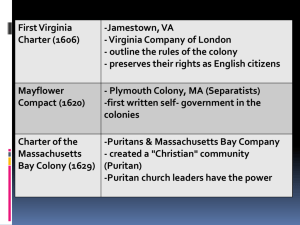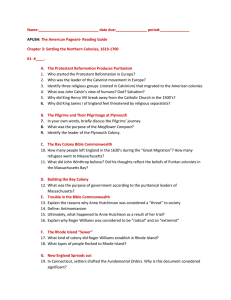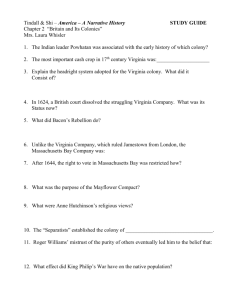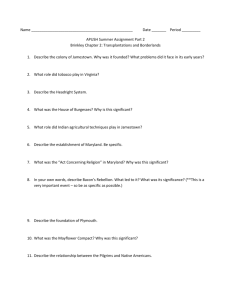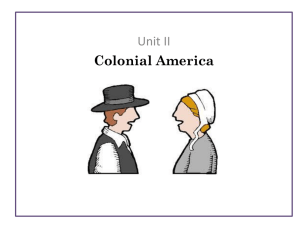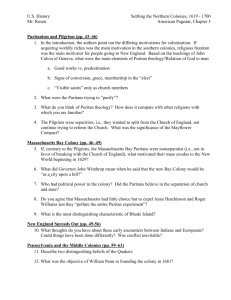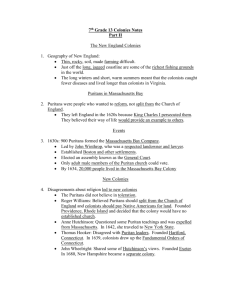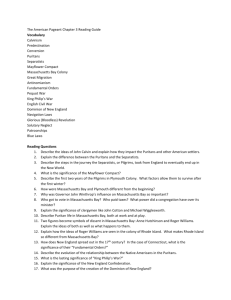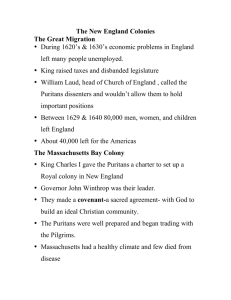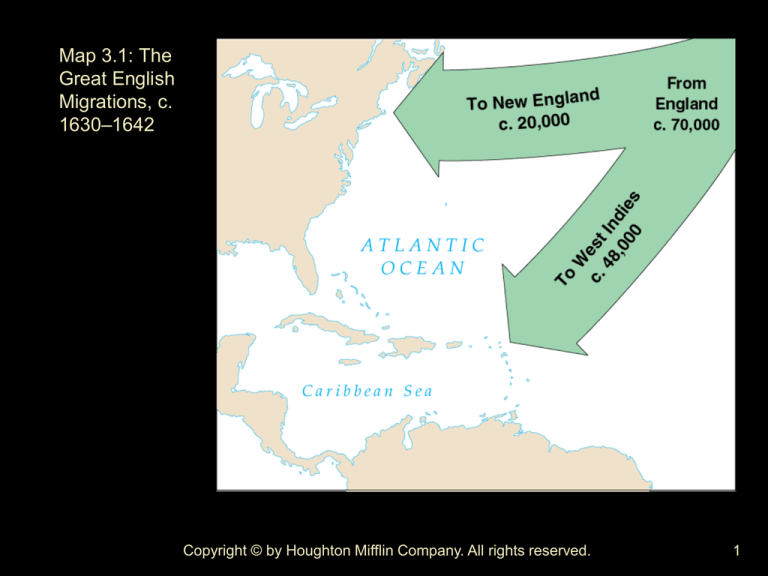
Map 3.1: The
Great English
Migrations, c.
1630–1642
Copyright © by Houghton Mifflin Company. All rights reserved.
1
The Puritans
• “Purification” of the Protestant Church
– Only visible saints should be in the church.
– Not the norm in England in the early 1600s.
• Fled the persecution of King James I for
Holland in 1608.
• Get permission to settle in Virginia and
miss their target, landing in Massachusetts
in 1620 on the Mayflower.
Importance of the Mayflower
Compact
• Signed by 41 males.
• Formed a “government” and agreed that
the settlers would submit to the will of the
majority.
• Sets the precedent for future documents
governing colonies and later states.
• Town meetings
Plymouth
• First winter goes very badly. Only 44 out
of 102 survive.
• Fall 1621- First Thanksgiving
• William Bradford- Elected governor 30
times.
• As iconic as the “Pilgrims” and “Plymouth
Rock” are in American tradition, the colony
is never very large or important
economically. Merges with Massachusetts
Bay in 1691.
Map 3.3:
Seventeenth-Century
New England
Settlements
Copyright © by Houghton Mifflin Company. All rights reserved.
5
Massachusetts Bay Colony
• Group of Puritans given a charter in 1629.
• 11,000 reach Massachusetts in 1630, part of the
“Great Migration” from England during the
1630s.
• Leadership of John Winthrop
– First governor
– His leadership, along with others, led the colony to be
the most influential outpost in New England
– “We shall be as a city upon a hill”
Life in Massachusetts Bay
• Freemen get to vote
– Adult males belong to Puritan churches
• Purpose of government was to enforce
God’s laws
• Nonbelievers and believers paid taxes for
the government-supported church
• Clergymen could not hold public office
• “Protestant ethic”- serious commitment to
work
Dissension in Massachusetts Bay
• Anne Hutchinson
– View on predestination
– Banished from the colony for heresy
• Roger Williams
– Wanted to break from the Church of England
completely
– Condemned the charter for taking land from Indians
without fair compensation
– Civil government cannot regulate religious behavior
– Banished from the colony
Rhode Island
• Williams flees Massachusetts to Rhode
Island and sets up a Baptist church at
Providence
• COMPLETE freedom of religion
• No oaths regarding religious beliefs
• No compulsory worship attendance
• No taxes to support a state church
Rhode Island
• Freedom of opportunity
• Nicknamed “Rogue’s Island” because of
the settlements of people who were either
exiled or displeased with Massachusetts
Bay
• Receives a charter from Parliament in
1644.
Connecticut
• Hartford settled by small numbers of Dutch
and English as well as some Boston
Puritans in 1635-1636. Becomes the
Connecticut River Colony
• Fundamental Orders of Connecticut (1639)
– Democratic regime controlled by the
wealthy, landowning citizens.
• New Haven, settled by Puritans, “merged”
with other Connecticut settlements in 1662
charter
New England expansion
• Massachusetts Bay purchases the area
along the coast of Maine in 1677.
• New Hampshire becomes a royal colony in
1679 after the king separated it from
Massachusetts Bay
Relations with Native Americans
• Wampanoag chief Massasoit signs treaty
with Plymouth 1621. First Thanksgiving
• 1637- Pequot War
• Small effort to convert Indians to
Christianity, but these were weak at best
King Philip’s War
• Metacom (King Philip) creates an alliance of
New England tribes to assault English villages
• War ends in 1676
– 52 Puritan towns attacked, 12 destroyed
– Hundreds of colonists and thousands of
Indians dead
– Slows the westward expansion of New
England until the early 1700s
– Lasting defeat for the Indians
New England Confederation
• Defense against the Indians, French, and
Dutch
• Had jurisdiction over intercolonial
problems
• Two Massachusetts colonies and two
Connecticut colonies
• First small step toward colonial unity
England takes notice
• Colonies have become nearly independent
commonwealths by 1660
• When Charles II comes to power, he
punishes Massachusetts Bay for not
following royal orders
• 1662- Connecticut gets charter
• 1663- Rhode Island gets new royal charter
• 1684- Massachusetts Bay Colony has
charter revoked
Dominion of New England
• Imposed on the colonies by England in
1686
• Bolster colonial defense
• Designed to promote efficiency in English
Navigation Laws
– Meant to choke off American trade with
countries besides England
Map 3.4: Sir Edmund
Andros's Dominion of
New England
Copyright © by Houghton Mifflin Company. All rights reserved.
18
The “First” American Revolution
• Sir Edmund Andros heads the Dominion of
New England
– Restricts town meetings
– Restricts freedom of the press
– Levees taxes without consent of reps.
• When the news of the Glorious Revolution
in England reaches the colonies, they
send Andros back to England
Effects of the Glorious Revolution
• Massachusetts made a royal colony with a
new charter, royal governor, and all male
property holders given the right to vote
• New monarchs relaxed the Navigation
Laws, and the period of “salutary neglect”
begins
• More English officials in America
• Led to contempt and resentment
Map 3.5: Early
Settlements in the Middle
Colonies, with Founding
Dates
Copyright © by Houghton Mifflin Company. All rights reserved.
21
New Netherland
• Dutch East India Company hires Henry
Hudson. Explores up the Hudson River in
1609 and files a Dutch claim to the area.
• New Netherland (1623-24)
– Most important thing was buying Manhattan
Island from the Native Americans for pennies
an acre.
• New Amsterdam run by the Dutch East
India Company
New Amsterdam
• Little religious toleration
• Free speech and democratic practices are
minimal.
• Hudson River becomes the picture of
affluence.
– Patroonships- feudal estates that were given
to wealthy settlers who agreed to have fifty
people settle on them
Dutch tensions with neighbors
• New England uneasy with the growth of
New Netherland
• Dutch invade New Sweden under Peter
Stuyvesant and absorb the Swedish
colonists living there.
English take over New York
• English seize New Amsterdam without
firing a shot. Renamed New York after the
Duke of York, brother of Charles II
• England gains an extremely important
harbor in the middle colonies and control
of the Hudson River
• The aristocratic spirit that existed under
the Dutch expands under the English
influence of the corrupt governors
Pennsylvania
• Quakers
– “Quaked” when moved by their religious
emotion
– Refused to pay taxes to the Church of
England
– Refused to take oaths
– Pacifists
– Refused military service
Pennsylvania (1681)
• William Penn
– Obtains a land grant from the king of England
in the area of what is now Pennsylvania
– Advertises in multiple languages for people to
come to his colony.
– Haven for the Quakers
– Liberal land policy attracts immigrants.
Encouraged laborers to own land, not just the
wealthy.
Penn’s Influence
• Buys land from Chief Tammany.
• Quakers had good relationship with Native
Americans, later immigrants did not.
• Government
–
–
–
–
–
–
Representative assembly elected by landowners
No tax-supported state church
Freedom of worship
Death penalty for treason and murder only
No provision for military defense
No restriction on immigration
Penn’s Melting Pot
• People from many ethnic groups come to
Pennsylvania
• By 1700, only Virginia and Massachusetts
have more population and wealth
• Penn created a land of opportunity, but
dies with little appreciation for what he had
done.
Common elements of the Middle
Colonies
• Fertile Soil
• “Bread Colonies”
• Rivers drew exploration inland from the
coast
• Lumbering and shipbuilding
• Medium-sized farms
• More ethnically mixed populations

